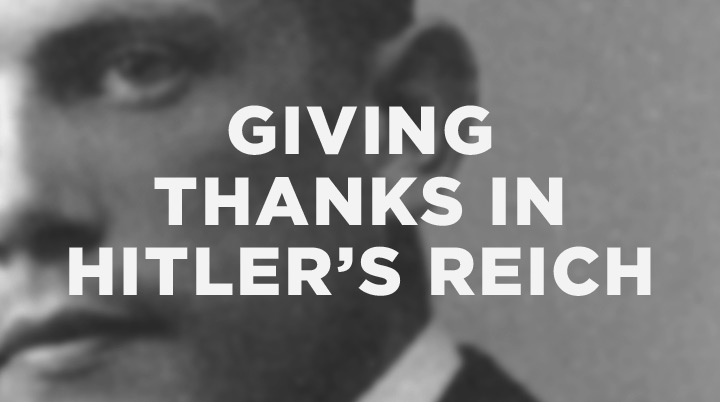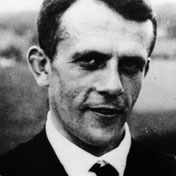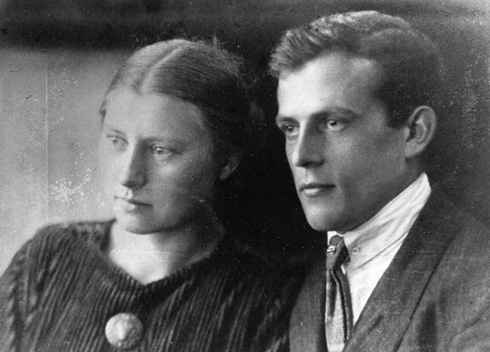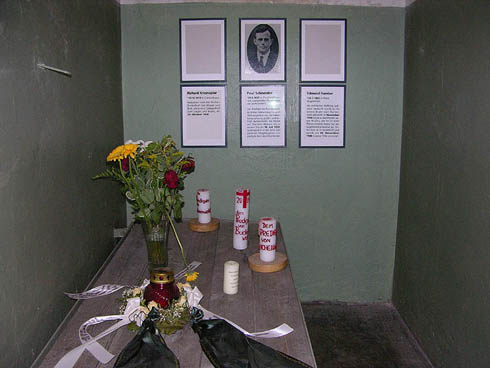Latest
-
Objections to the Christian Faith from the Unchurched and De-Churched
 Tue Dec 02, 2014
Tue Dec 02, 2014
by Resurgence -
Craig Groeschel: We Innovate for Jesus
 Tue Oct 14, 2014
Tue Oct 14, 2014
by Resurgence -
Mark Driscoll: Revelation
 Tue Oct 07, 2014
Tue Oct 07, 2014
by Resurgence -
RESURGENCE LEADERSHIP #034: JOHN PIPER, WHY I TRUST THE SCRIPTURES, PART 2
 Tue Sep 30, 2014
Tue Sep 30, 2014
by Resurgence -
Resurgence Leadership #033: John Piper, Why I Trust the Scriptures, Part 1
 Tue Sep 23, 2014
Tue Sep 23, 2014
by Resurgence

Archives
Giving thanks in Hitler’s Reich

The first Protestant pastor to be executed by the Nazis was an obscure village pastor who could have escaped persecution completely had he simply been willing to keep his mouth shut. This article is reprinted with permission from First Things, where Timothy George is a columnist.
 Paul Robert Schneider (1897–1939) was the first Protestant pastor to die
Paul Robert Schneider (1897–1939) was the first Protestant pastor to die
in a concentration camp at the hands of the Nazis. His story is one of
unmitigated courage, self-sacrifice, and martyrdom. Only in recent
years has he begun to receive some of the recognition he deserves.
Schneider was not a theologian of first rank like Karl Barth or Dietrich Bonhoeffer, nor a hero like the Polish friar Maximillian Kolbe, who sheltered thousands of Jews and eventually exchanged his own life for one of his Auschwitz cellmates. Nor did Schneider live in a large urban center like Martin Niemöller, the Confessing Church leader in Berlin, or the Catholic bishop Clemens August Graf von Galen, the “Lion of Münster.” Paul Schneider, rather, was an obscure village pastor who could have escaped persecution completely had he simply been willing to keep his mouth shut.
Small-town pastor
The son of a German Reformed pastor, Schneider followed in his father’s footsteps, succeeding him in 1926 as leader of the Protestant church in the small town of Hochelheim. By that time, his early flirtation with liberal theology had given way to a more vigorous biblical and Christocentric faith, influenced in part by his teacher Adolf Schlatter. In 1933, the year of Hitler’s assumption of power, Schneider ran afoul of local Nazi leaders in his community who forced his transfer to the even more remote village of Dickenschied.
Paul Schneider’s story is one of unmitigated courage, self-sacrifice, and martyrdom.
Schneider had been there hardly a month when he was asked to preside at the funeral of a seventeen-year-old member of the Hitler Youth named Karl Moog. Before the benediction had been pronounced, the local Nazi district leader, Heinrich Nadig, interrupted the service to declare that young Karl had now crossed over into the heavenly storm troop of Horst Wessel, to which Schneider replied: “I do not know if there is a storm of Horst Wessel in eternity, but may the Lord God bless your departure from time and your entry into eternity.”
Standing above Jesus?
Sturmführer Horst Wessel was a Nazi party activist and author of the popular Nazi hymn “The Flag on High” (also called the Horst-Wessel-Lied). After his violent death in 1930, he was elevated as a hero in the Nazi pantheon. The Wessel story was incorporated into the pagan mythology the Nazis were seeking to revive. Alfred Rosenberg, the master of Nazi ideology, claimed that Wessel had not really died but now led a celestial storm troop. Those who died in the service of the Nazis, like young Karl Moog, were summoned to join the Wessel storm troop above. Just six months prior to the funeral incident, the Nazi bimonthly Der Brunnen declared: “How high Horst Wessel towers over that Jesus of Nazareth—that Jesus who pleaded that the bitter cup be taken from him. How unattainably high all Horst Wessels stand above Jesus!”
Pastor Schneider refused to subordinate the Christian gospel to such a pagan myth. When Nadig repeated his graveside claim about Horst Wessel, Schneider said: “I protest. This is a church ceremony, and as a Protestant pastor, I am responsible for the pure teaching of the Holy Scriptures.”
After this confrontation, Schneider was placed in prison for five days, but he did not back down. In a letter to the Nazi leader he explained his position:
In a Protestant church ceremony God’s voice has to be clearly heard from the Holy Scriptures. Our church people are liberalized enough, so it is no longer appropriate to allow just any opinion to be expressed in the church. There can no longer be any place for this because especially at a church funeral the seriousness of eternity does not tolerate being measured by human standards. Therefore, not everyone who does his duty in the Hitler Youth or the SA fairly well can be beatified. I will certainly accept the earthly storm of Horst Wessel, but that does not mean by a long shot that God will allow him to march straight into eternal salvation. That is perhaps “German faith,” but it is not biblically based Christian faith that takes seriously the full reality of sin that is so deeply rooted in the heart and life of man.
“Never preach again”
Over the next four years there were more conflicts and more imprisonments for Pastor Schneider. His wife Margarete—he called her Gretel—supported him with her love, prayers, and correspondence. On one occasion, he wrote back to her from prison: “And now, today, the laundry arrived together with the Heidelberg Catechism, your letter, butter, and chocolate.” To his six children, ages one to ten, he wrote these words: “Keep on praying that God in his love and mercy may bring your father back and that we may all remain in Dickenschied. Even if God keeps us waiting awhile for the fulfilment of our prayers, we must not think that he does not hear us, and we must not tire because it takes so long. Though God helps not in every deed / He’s there in every hour of need.”
 Paul and his wife Margarete
Paul and his wife Margarete
Later, he was officially deported from the Rhineland by the Gestapo and warned never to preach again in his church. Schneider ripped up the deportation order in the presence of the Gestapo official and wrote a personal letter to Hitler declaring that he could not in good conscience obey it. The consequences of such defiance were not hard to guess, nor long in coming. One friend warned him that he should at least “let some more water flow down the Rhine” before he tried to return to his church. Even his dear Gretel said, “Do not push yourself to be a martyr!”
A Thanksgiving sermon
Yet on October 3, 1937, the Sunday of Harvest Thanksgiving (Erntedankfest in German), Paul Schneider was once again—and for the last time—preaching in his pulpit at Dickenschied. His text was Psalm 145:15–21, which says:
The eyes of all look to you, and you give them their food in due season. You open your hand; you satisfy the desire of every living thing. The Lord is righteous in all his ways and kind in all his works. The Lord is near to all who call on him, to all who call on him in truth. He fulfills the desire of those who fear him; he also hears their cry and saves them. The Lord preserves all who love him, but all the wicked he will destroy. My mouth will speak the praise of the Lord, and let all flesh bless his holy name forever and ever.
He began the sermon by acknowledging how incongruous it might seem to be giving thanks “in this year of our church’s hardship.” Yet this is precisely what the psalmist calls us to do—to give thanks for the material blessings of harvest and home and also for the generous gifts of God in Word, sacrament, and worship. Yet God’s Word does not come cheap, Schneider said. “Confessing Jesus will carry a price. For his sake we will come into much distress and danger, much shame and persecution. Happy the man who does not turn aside from these consequences.”
He ended the sermon by quoting from a poem by Heinrich Heine, the popular nineteenth-century Jewish writer whose books had been burned by the Nazis. This poem depicted the judgment visited on Belshazzar (read Hitler) who spurned the call to repentance.
God’s Word does not come cheap, Schneider said. “Confessing Jesus will carry a price.”
There was both gratitude and warning in Schneider’s sermon, for, as he said, God’s Word is one of both grace and judgment. This Word was to be declared not only in the cozy comfort of the congregation but also “outside in the world too and in public, to those who want to hear it and to those who do not want to hear this, before this nation and state and all earthly authorities.” Quoting from the prophet Jeremiah, Schneider appealed: “Therefore, O Land, O Land, O Land—hear the word of the Lord” (Jer. 22:29).
Word about the sermon spread quickly. That evening, while en route to preach in another church, Schneider’s way was blocked by the flashing lights of the police. He was arrested and soon found himself as inmate #2491 in the concentration camp at Buchenwald.
The concentration camp preacher
Gretel’s 1953 biography of her husband was titled The Preacher of Buchenwald, and this is how Schneider is best remembered by those who know him at all. He never ceased to preach God’s love and grace in Christ to his fellow prisoners. While in solitary confinement he called out to them every day at the morning roll call, even though such utterances brought vicious reprisals from his captors. When asked by a fellow inmate why he continually subjected himself to such brutality, Schneider replied, “Somebody has to preach in this hell.”
 Paul's prison cell
Paul's prison cell
Another inmate, Alfred Leikam, summarized Schneider’s ministry at Buchenwald this way: “Wholly without fear, he bore witness of his Christian faith to the SS. In this frankness, he was probably unique in Germany. He called the devil by his name: murderer, adulterer, unrighteous, monster. Throughout this witness, in which he presented the grace of Christ together with a call to repentance, Schneider was exposed alternately to severe bodily tortures, humiliations, and agonies.”
When asked by a fellow inmate why he continually subjected himself to such brutality, Schneider replied, “Somebody has to preach in this hell.”
On July 18, 1939, he was killed by the camp doctor who administered a lethal injection of strophanthin. Gretel drove to Buchenwald and retrieved the body of Paul Schneider and returned it to Dickenschied for burial. Hundreds of people swarmed the village for Schneider’s funeral. Many pastors, including the priest of the local Catholic Church, joined the procession to the cemetery. One of the Gestapo officers sent to observe the proceedings remarked to one of the pastors, “This is the way kings are buried!” to which the pastor replied: “Hardly! What is happening here is that a blood witness of Jesus Christ is borne to the grave.”
Timothy George is founding dean of Beeson Divinity School of Samford University and chairman of the board of the Chuck Colson Center for Christian Worldview.